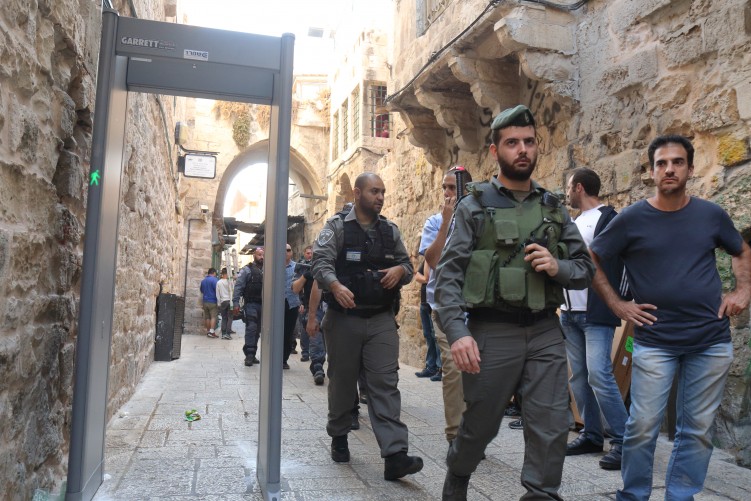
Police Dismantle Temple Mount Metal Detectors, Cameras
Israel Police dismantled metal detectors and security cameras at the entrances to the Temple Mount compound overnight between Monday and Tuesday less than two weeks after they had been placed there in the wake of the July 14 murder of two policeman adjacent to the site.
After a meeting that ran late into Monday night, the Prime Minister’s Office issued a statement saying that the Security Cabinet had “accepted the recommendation of all the security bodies to incorporate security measures based on advanced technologies and other measures instead of metal detectors in order to ensure the security of visitors and worshippers in the Old City and on the Temple Mount.”
The advanced technologies are believed to include thermal cameras and face recognition. The Security Cabinet allocated a budget of up to NIS 100 million to implement the plan over a time frame of up to six months. The PMO statement said that until the plan was implemented the police presence on the Mount would be beefed up.
Later in the day, it transpired that security cameras installed three days ago would also be removed.
The stationing of the metal detectors led to widespread protests and Muslims refused to pass through them on the way to the mosques on the site, instead holding mass prayers outside the gates. Daily clashes ensued between police and rioters in east Jerusalem. Clashes also took place throughout Judea and Samaria. Four Palestinians were killed in the riots, one when an explosive device he was attempting to throw at security forces blew up in his own hands.
On Friday, July 21, a Palestinian entered a home in the community of Neve Tzuf and massacred three members of the Salomon family, claiming that he was reacting to the “defilement” of the mosques. On Sunday, a Palestinian stabbed a man in Petah Tikvah, saying he had done it “for Al-Aqsa.”
Hours before the cabinet meeting, Netanyahu held a telephone conversation with Jordan’s King Abdullah, the custodian of the Muslim holy places, in order to facilitate the return to Israel of the staff of its embassy in Amman following an incident in which a security guard was attacked and shot dead his assailant and another man.
The security guard and the rest of the embassy staff returned to Israel shortly after.
Jordan’s official Petra news agency later carried a report about the phone call, which made no mention of the embassy incident, but called for the situation at the Temple Mount compound to be restored to what it was prior to the crisis.
Media reports earlier in the day speculated that a deal would be made to allow the guard to return to Israel in exchange for the lifting of the security measures at the Mount.